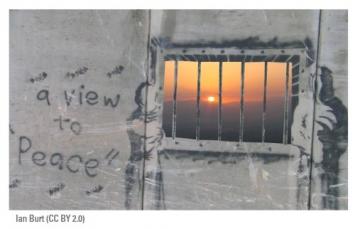
The Gaza Strip will be unlivable by 2020. That is what the United Nations has continued to warn as the world mobilizes efforts to achieve the 2030 Agenda for Sustainable Development and its 17 Sustainable Development Goals (SDGs) by the universally agreed deadline.
Palestine is struggling to survive, attempting the path to development despite dire conditions imposed by Israel that have led to severe water shortages and food insecurity, limited employment opportunities, loss of property and resources, and many more devastating effects—some unfathomable such as daily threats on Palestinian lives.
In a report submitted at the 30th Ministerial Session of the United Nations Economic and Social Commission for Western Asia (ESCWA) held in Beirut from 25 to 28 June, ESCWA describes these Israeli practices and policies in detail, underlining the economic and social effects of an 11-year blockade on the Palestinian people.
The Session, which this year focused on "technology for sustainable development in the Arab region", dedicated a segment to the situation of Palestine and adopted a resolution in which Arab States reiterated their support to Palestine, condemned Israeli practices, and affirmed Jerusalem as the Palestinian capital.
Recommendations to support the Palestinian people
In the resolution, member States recommended that the ESCWA Secretariat continue to monitor and analyse social and economic conditions in the occupied Palestinian territory (oPt), the impact of the Israeli practices and policies, and the violations of international law perpetrated in the context of the occupation.
The document states that real gross domestic product (GDP) growth in the oPt dropped significantly as unemployment rates among women and men increased due to Israeli policies and practices negatively impacting sectors that generate income and create jobs. In 2017, more than one fifth of Palestinian households were found to be food insecure, while in Gaza the numbers had fallen to the lowest levels due to limited access to agricultural lands, low supply and quality of water, intermittent energy supply and poor diets. About 2.5 million Palestinians are reportedly in need of humanitarian assistance.
Meanwhile, medical facilities across the oPt face supply shortages with an estimated 490,145 children facing challenges to access quality education in a safe, child-friendly environment.
ESCWA stressed that interventions are needed to spur industrial success to overcome the extraordinary constraints imposed by the occupation and to unleash the potential for resource-based manufacturing in the oPt. Further studies are expected to be carried out on selected sectors namely the mineral-based industry, agriculture and tourism, to evaluate the potential they hold and hindrances that constrain them.
Member States requested that the ESCWA Secretariat continue its work by providing research, studies and technical support to Palestinian institutions in accordance with their needs, in addition to supporting data collection and analysis to develop policies and programs that contribute to reducing the impact of the Israeli occupation.
A report presented by ESCWA to the Ministerial Session categorized the Israeli practices and policies as follows: land grab, land confiscation and seizure, displacement, revocation of residency permits, deportations, home demolitions, evictions and forced relocations, oppression, excessive use of force with impunity, arbitrary detention and ill-treatment, and collective punishment.
The ESCWA Secretariat invited member States to intensify communication with its own body as well as with the League of Arab States (LAS) and other concerned United Nations agencies that support the Palestinian people in their quest for the full attainment of their rights. It also called on Arab States to increase their support to the UN Relief and Works Agency for Palestine (UNRWA) so it can continue to deliver assistance and basic services to refugees until their right to return is realized.
International support within the Economic and Social Council
One month later, the Economic and Social Council (ECOSOC), the UN organ to which ESCWA reports, adopted a resolution on 24 July regarding Palestine following a presentation delivered by Tarik Alami, the Director of the Emerging and Conflict-Related Issues Division at ESCWA, entitled “the economic and social repercussions of the Israeli occupation on the living conditions of the Palestinian people in the Occupied Palestinian Territory, including East Jerusalem and of the Arab population in the occupied Syrian Golan”.
These findings are included in a report prepared annually on behalf of the Secretary-General of the United Nations and submitted to ECOSOC. This year, the resolution also included a paragraph on the situation of the Palestinian detainees in Israeli prisons and a condemnation of Israel’s detainment of the bodies of Palestinians.
The report will be presented to the United Nations General Assembly in November, when another resolution on this pressing issue is expected to be adopted.





